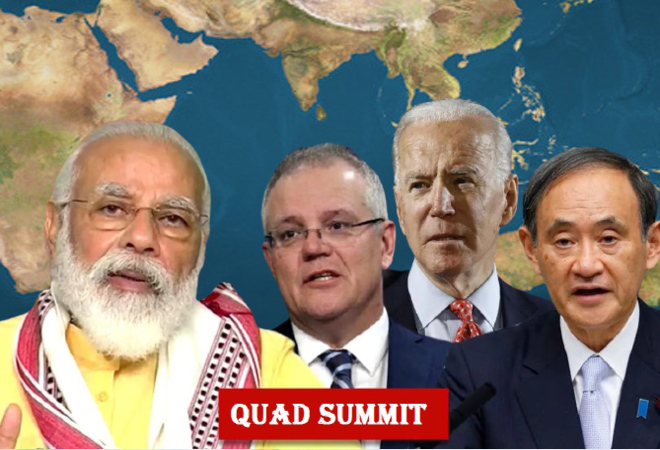
The first virtual summit of the Quad involving the top leaders of the 4 member countries was held on March 12. The group in its joint statement reaffirmed commitment to strive for a free and open Indo-Pacific that is also inclusive, healthy, anchored by democratic values, and unconstrained by coercion.
The group committed itself to promoting a free, open rules-based order, rooted in international law to advance security and prosperity and counter threats to both in the Indo-Pacific and beyond. Support for the rule of law, freedom of navigation and overflight, peaceful resolution of disputes, democratic values, and territorial integrity, will be the agenda for the Quad.
The group has pledge to respond to the economic and health impacts of COVID-19, combat climate change, and address shared challenges, including in cyber space, critical technologies, counter-terrorism, quality infrastructure investment, and humanitarian-assistance and disaster-relief as well as maritime domains.
The statement of the group has planned to work in 3 primary areas through partnerships and dedicated working groups.
- The Quad Vaccine Partnership
- The Quad Climate Working Group
- The Quad Critical and Emerging Technology Working Group
The Quad Vaccine Partnership
- Quad partners will launch a landmark partnership to further accelerate the end of the COVID-19 pandemic and will work together to strengthen and assist countries in the Indo-Pacific with vaccination, in close coordination with the existing relevant multilateral mechanisms including WHO and COVAX.
- Quad partners are working collaboratively to achieve expanded manufacturing of safe and effective COVID-19 vaccines at facilities in India, prioritizing increased capacity for vaccines authorized by Stringent Regulatory Authorities (SRA).
- Quad partners will address financing and logistical demands for production, procurement, and delivery of safe and effective vaccines. Quad partners will work to use our shared tools and expertise, through mechanisms at institutions including the United States Development Finance Corporation (DFC), Japan International Cooperation Agency (JICA), and, as appropriate, Japan Bank of International Cooperation (JBIC), as well as others.
- The United States, through the DFC, will work with Biological E Ltd., to finance increased capacity to support Biological E’s effort to produce at least 1 billion doses of COVID-19 vaccines by the end of 2022 with Stringent Regulatory Authorization (SRA) and/or World Health Organization (WHO) Emergency Use Listing (EUL), including the Johnson & Johnson vaccine.
- Japan, through JICA, is in discussions to provide concessional yen loans for the Government of India to expand manufacturing for COVID-19 vaccines for export, with a priority on producing vaccines that have received authorization from WHO Emergency Use Listing (EUL) or Stringent Regulatory Authorities.
- Quad partners will ensure expanded manufacturing will be exported for global benefit, to be procured through key multilateral initiatives, such as COVAX, that provide life-saving vaccines for low-income countries, and by countries in need.
- Quad partners will also cooperate to strengthen “last-mile” vaccination, building on existing health-security and development programs, and across our governments to coordinate and strengthen our programs in the Indo-Pacific. This includes supporting countries with vaccine readiness and delivery, vaccine procurement, health workforce preparedness, responses to vaccine misinformation, community engagement, immunization capacity, and more.
- Australia will contribute US$77 million for the provision of vaccines and “last-mile” delivery support with a focus on Southeast Asia, in addition to its existing commitment of US$407 million for regional vaccine access and health security which will provide full vaccine coverage to nine Pacific Island countries and Timor-Leste, and support procurement, prepare for vaccine delivery, and strengthen health systems in Southeast Asia.
- Japan will assist vaccination programs of developing countries such as the purchase of vaccines and cold-chain support including through provision of grant aid of $41 million and new concessional yen loans, ensuring alignment with and support of COVAX.
- The United States will leverage existing programs to further boost vaccination capability, drawing on at least $100 million in regional efforts focused on immunization.
The Quad Climate Working Group
The group has identified the climate challenge as a priority for the Quad and the Indo-Pacific region. Quad will establish a new Climate Working Group focused on:
- Cooperation, both among ourselves and with other countries, to strengthen implementation of the Paris Agreement, including to keep a Paris-aligned temperature limit within reach;
- Working together and with other countries to support, strengthen, and enhance actions globally;
- Committing to advancing low-emissions technology solutions to support emissions reduction;
- Cooperation on climate mitigation, adaptation, resilience, technology, capacity-building, and climate finance.
The Quad Critical and Emerging Technology Working Group
A free, open, inclusive, and resilient Indo-Pacific region requires that critical and emerging technology is governed and operated according to shared interests and values. In that spirit, Quad will convene a Critical and Emerging Technology Working Group, which will:
- Develop a statement of principles on technology design, development, and use;
- Facilitate coordination on technology standards development, including between our national technology standards bodies and working with a broad range of partners;
- Encourage cooperation on telecommunications deployment, diversification of equipment suppliers, and future telecommunications, including through close cooperation with our private sectors and industry;
- Facilitate cooperation to monitor trends and opportunities related to developments in critical and emerging technology, including biotechnology;
- Convene dialogues on critical technology supply chains.
